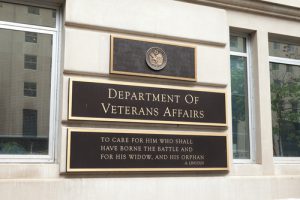
Fraught with ongoing issues, the U.S. Department of Veterans Affairs (VA) requires more internal administrative measures that also could provide Congress with vital insight needed for proactive decision-making, says U.S. Rep. Randy Hultgren (R-IL).
“Instead of taking a reactive approach to VA scandal, Congress should engage in rigorous oversight relying on clear measurements to make sure that our veterans are given access to the health care, education, job training and other services they need and deserve,” Rep. Hultgren wrote in a recently submitted statement to the U.S. House Veterans’ Affairs Committee, which held a May 22 hearing assessing the VA’s governance structure.
Rep. Hultgren supports congressional oversight of the VA and a new agency focus on value and positive outcomes for veterans gained via return on investment (ROI) measures, the congressman’s staff said in a May 21 statement.
“Currently, Congress lacks adequate tools to measure the benefits of the VA to veterans or the inadequacies of VA programs that are not producing positive outcomes,” according to the statement. “Introducing analysis of [ROI] in the VA could empower the agency to meet veterans where they are, provide them with the services and assistance they need, and ensure taxpayers dollars are used effectively.”
Congress could achieve a higher level of VA oversight, according to Hultgren’s statement, if granted access to either the ROI tool, its output or both – what he called the “first step in ensuring we have the information we need to determine what’s working and what isn’t earlier rather than too late.”
Right now, the House Veterans’ Affairs Committee is investigating multiple reports of what isn’t working.
For example, during Tuesday’s hearing, VA Inspector General Michael Missal testified about continued governance issues that exist between VA’s Veterans Health Administration (VHA), which nationwide manages more than 145 VA medical centers (VAMC) and 1,230 outpatient sites, and the 18 regional networks known as Veterans Integrated Service Networks (VISN), which oversee the VAMC and outpatient sites.
Missal’s office, he testified, “has had a longstanding focus of governance issues in VHA.” Work conducted since 2012, Missal said, “suggests that there continues to be leadership and governance issues between medical centers and their VISN, as well as between VISNs and the VA central office.”
“Where there are deficiencies in leadership and governance there likely will be a cascade of persistent and pervasive problems like those we found at the Washington, D.C., VAMC,” he said, where a confidential source alleged in March 2017 that patients and resources were at risk.
In a subsequent interim report issued by the Office of the Inspector General in April 2017, Missal testified that the OIG found, among numerous problems, dirty conditions in some storerooms; millions of dollars in non-inventoried supplies and equipment; inaccurate and underutilized supply, instrument and equipment inventories that made it difficult to meet healthcare provider and patient needs; and numerous vacancies in key positions that further hindered remediation of these conditions.
“Although the findings and recommendations focus on improvements in that facility, the issues raised could be used almost as a checklist for other facilities, VISNs, and VHA leaders,” Missal testified.
Rep. Hultgren thinks an overall solution is to provide Congress with “trusted access” to VA information about how the agency’s federal appropriations demonstrate measurable successes for veterans – “to determine and assess ROI for the VA and the programs it administers at the local level,” he wrote.
For example, the VA’s Veterans Employment Services Office could be a good VA program where ROI measurement would help the agency more accurately determine veterans’ needs, the congressman wrote.
“The objective is not only a greater ROI in terms of dollars spent, but a more meaningful ROI when it comes to a patient’s experience, recovery and quality of life,” Rep. Hultgren wrote.
The best way for the VA to serve military veterans, the congressman concluded, “is for the agency and Congress to know empirically how and to what extent the VA is helping veterans. It’s time for Congress to bring value- and outcome-based ROI measures to the VA and the veterans it serves.”



